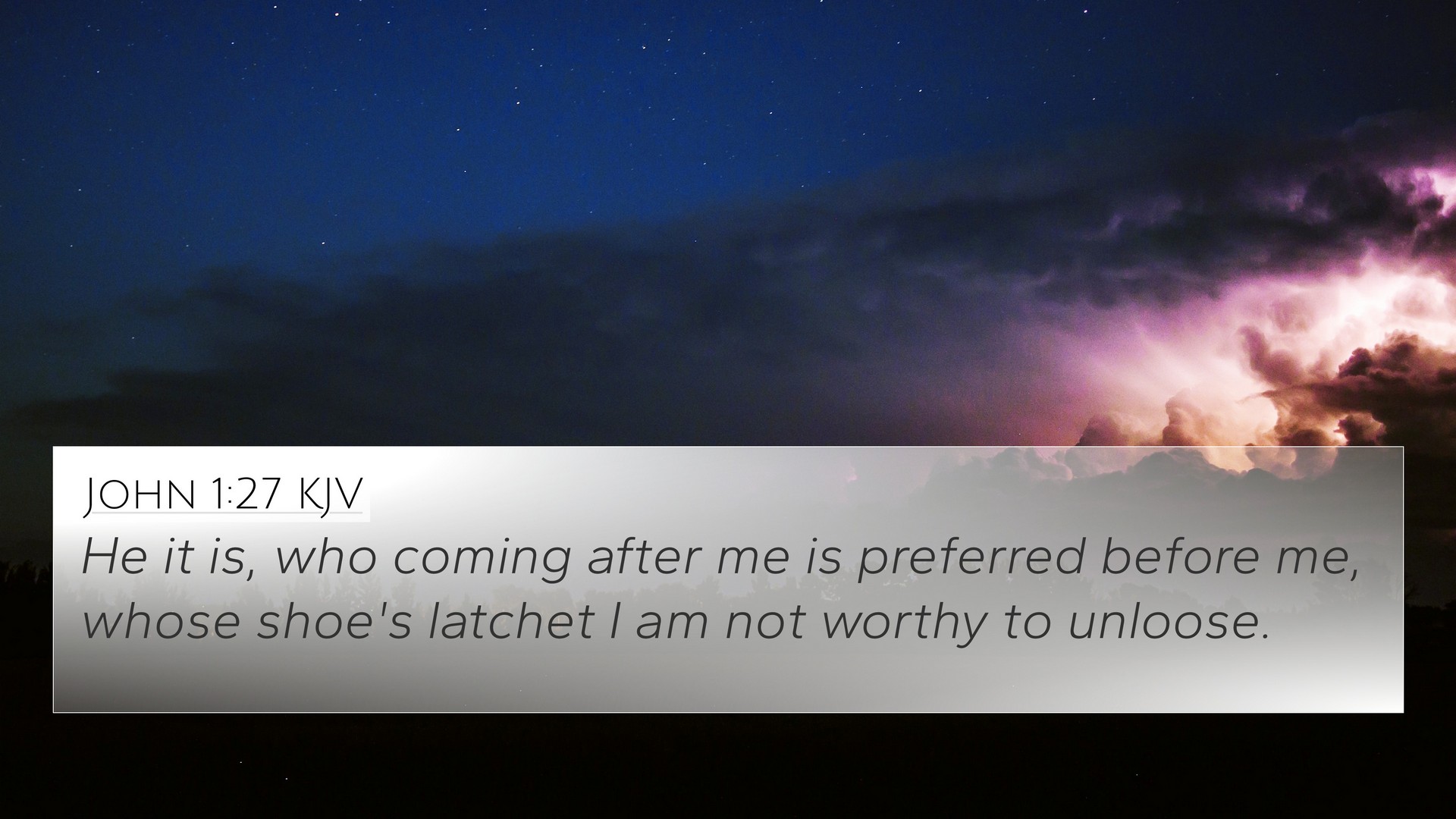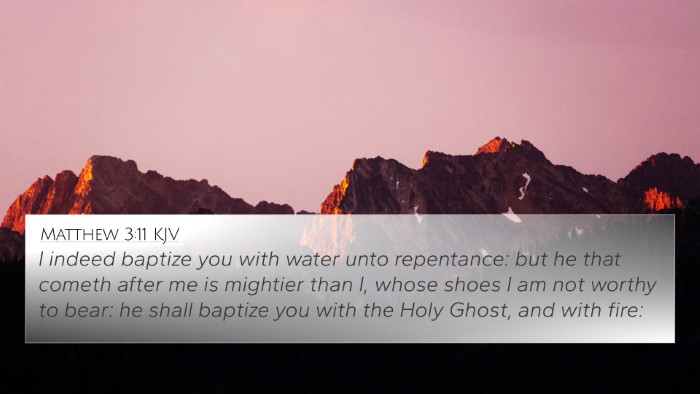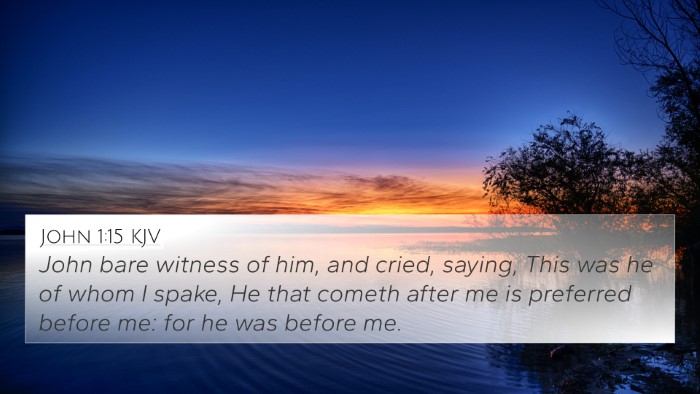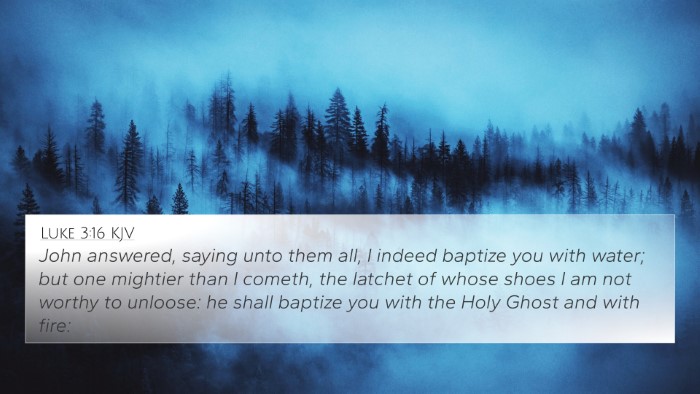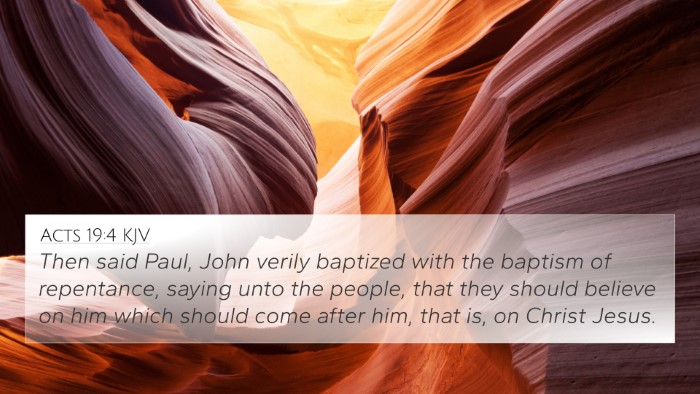Understanding John 1:27
John 1:27 states, "He it is, who coming after me is preferred before me, whose shoe's latchet I am not worthy to unloose." This verse captures the essence of John's acknowledgment of Jesus' superiority and mission.
Commentary Summaries
Matthew Henry's Commentary
Matthew Henry emphasizes the humility of John the Baptist in this verse. John recognizes his position as a forerunner for Christ, who is far greater. He highlights the humility required in serving Christ and the importance of recognizing one’s own limitations in the presence of divine greatness.
Albert Barnes' Commentary
Albert Barnes points out that John’s words demonstrate his deep respect and reverence for Jesus. He notes that untying the sandal was considered a task of the lowest servant, thus indicating John’s view of Jesus as the supreme authority, and his own role as subordinate. It serves as an important reminder of the need for humility in our service to God.
Adam Clarke's Commentary
Adam Clarke elaborates on the cultural context of John's proclamation. He explains that in Jewish custom, a disciple might serve his teacher in various ways, but untying the sandals was a job reserved for slaves. Clarke emphasizes that John is not merely stating his inferiority; rather, he passionately acknowledges the divine status of Christ, marking the transition from the Old Covenant to the New Covenant.
Cross-References
John 1:27 connects with several key Bible verses, enhancing our understanding through Bible verse cross-references. Here are notable connections:
- Matthew 3:11: John the Baptist mentions that he baptizes with water, but the One coming after him will baptize with the Holy Spirit and fire.
- Mark 1:7: Similar to John 1:27, it records John's message of humility regarding the coming Messiah.
- Luke 3:16: This verse also emphasizes John's declaration of Jesus as the One who is greater than he is.
- John 3:30: John states, “He must increase, but I must decrease,” reflecting the same theme of humility and acknowledgment of Christ's superiority.
- Acts 19:4: References John's baptism, illustrating his role in preparing the way for Jesus.
- Matthew 11:11: Jesus himself honors John the Baptist, reaffirming his important role in the kingdom of heaven.
- Hebrews 10:9: Speaks about the fulfillment of God's will through Christ, echoing John's proclamation.
- Revelation 19:10: Emphasizes worship of God, reflecting the understanding of Christ's divine role.
- Philippians 2:9–11: Highlights the exaltation of Christ, who is superior to all and deserving of honor.
- Isaiah 40:3: The prophecy regarding the voice crying in the wilderness, pointing to John's role.
Thematic Connections
The verse significantly contributes to our understanding of key themes in the Bible:
- Divine Authority: The recognition of Jesus as having divine authority over all.
- Servanthood: The theme of humility and servanthood that characterizes true discipleship.
- The Forerunner: Understanding John the Baptist's role in preparing the people for Christ's coming.
- Inter-Biblical Dialogue: Connections between Old Testament prophecies and New Testament fulfillments.
- Jesus' Identity: Affirmations of Jesus’ divine identity dispersed throughout the Gospels.
Tools for Bible Cross-Referencing
For studying cross-references effectively, consider using:
- Bible concordance: A tool to find related verses quickly.
- Bible cross-reference guide: Various editions and studies focusing on scripture linkages.
- Online Bible reference resources: Digital platforms can assist with finding connections easily.
- How to use Bible cross-references: Engage methods that link scripture for deeper understanding.
- Cross-reference Bible study guides: These often include themes and methods for personal or group study.
Conclusion
John 1:27 is not only a profound statement of faith and humility, but it also invites us to explore deeper connections in Scripture. Understanding the dialogues between biblical texts enhances our faith journey and helps us comprehend the overarching narrative of the Bible.
